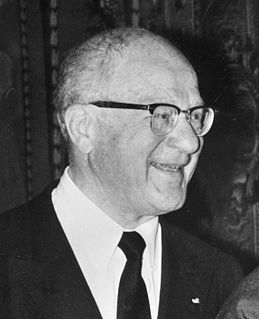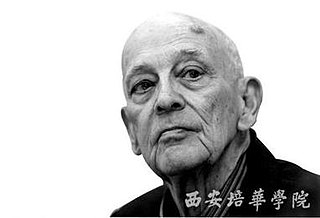A Quote by William James
Take the happiest man, the one most envied by the world, and in nine cases out of ten his inmost consciousness is one of failure. Either his ideals in the line of his achievements are pitched far higher than the achievements themselves, or else he has secret ideals of which the world knows nothing, and in regard to which he inwardly knows himself to be found wanting.
Related Quotes
Man is more than his environment. It is from the innate quality of the Spirit in him, his inner storehouse, that he draws those ideas, his intuitions, which unify his perceptions of the external world instantaneously with a value which is qualitative and not quantitative, and which he embodies in the works of his culture - those achievements which belong not only to one particular time but to all times, and mark the path of his upward progress.
Man... knows only when he is satisfied and when he suffers, and only his sufferings and his satisfactions instruct him concerning himself, teach him what to seek and what to avoid. For the rest, man is a confused creature; he knows not whence he comes or whither he goes, he knows little of the world, and above all, he knows little of himself.
The man is distinguished from the youth by the fact that he takes the world as it is, instead of everywhere fancying it amiss and wanting to improve it, i.e. model it after his ideal; in him the view that one must deal with the world according to his interest, not according to his ideals, becomes confirmed.
One who was born in the house of a warrior, regardless of his rank or class, first acquaints himself with a man of military feats and achievements in loyalty....Everyone knows that if a man doesn't hold filial piety toward his own parents he would also neglect his duties toward his lord. Such a neglect means a disloyalty toward humanity. Therefore such a man doesn't deserve to be called 'samurai'.
A man’s ignorance sometimes is not only useful, but beautiful - while his knowledge, so called, is oftentimes worse than useless, besides being ugly. Which is the best man to deal with - he who knows nothing about a subject, and, what is extremely rare, knows that he knows nothing, or he who really knows something about it, but thinks that he knows all?
A tough manager will have realistic quotas for his employees that he keeps to himself and aggressively stretch quotas, anywhere from ten percent higher to a lot more, which he imposes on his staff. If his people miss the stretch numbers but exceed the realistic goals, he's happy. If he's a superb manager, he knows how far they can stretch without breaking.
When the sacredness of one's word is matched in the attributes of his character throughout, all that constitutes a man, then we find that there is something in a man's life greater than his occupation or his achievements; grander than acquisition or wealth; higher than genius; more enduring than fame.
Man has reason, discrimination and free-will such as it is. The brute has no such thing. It is not a free agent, and knows no distinction between virtue and vice, good and evil. Man, being a free agent, knows these distinctions, and when he follows his higher nature, shows himself far superior to the brute, but when he follows his baser nature can show himself lower than the brute.
The government of the enlightened king? His achievements blanket the world but appear not to be his own doing. His transforming influence touches the ten thousand things but the people do not depend on him. With him there is no promotion or praise - he lets everything find its own enjoyment. He takes his stand on what cannot be fathomed and wanders where there is nothing at all.
The man who cannot listen to an argument which opposes his views either has a weak position or is a weak defender of it. No opinion that cannot stand discussion or criticism is worth holding. And it has been wisely said that the man who knows only half of any question is worse off than the man who knows nothing of it. He is not only one-sided but his partisanship soon turns him into an intolerant and a fanatic. In general it is true that nothing which cannot stand up under discussion or criticism is worth defending.
The whole purpose of spiritual direction is to penetrate beneath the surface of a man's life, to get behind the façade of conventional gestures and attitudes which he presents to the world, and to bring out his inner spiritual freedom, his inmost truth, which is what we call the likeness of Christ in his soul.









































